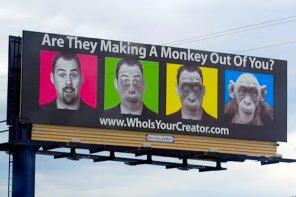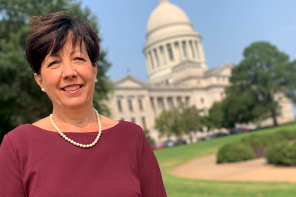Some argue that Charles Robert Darwin is the greatest scientist in history; others curse his name. Whatever your perspective, it would be hard to argue with the assertion that his ideas are some of the most influential of any Homo sapien to date.
For this Darwin Day, to celebrate the double anniversary—the 200th of his birth and the 150th of his magnum opus—RD asked a few scientists to reflect on this question: How does Darwin affect what you believe? Though they differ in presentation, the following responses share a conceptual thread. For more Darwin Day coverage see Denying Darwin: Another Peculiar American Institution and Five Things We Can Learn From Creationists.
* * *
Creation
daughter at four
When I consider your hair,
how it sticks out after I comb it,
how you sob when you cannot tie your shoes
and I rock you,
so with each move forward
you’re falling away from me,
with each move backward
you’re surging toward me,
then the pain of not being able to do what one wants
makes me tremble.
When I consider Darwin,
how cats in a town affect the number of flowers,
how your face looks
as you search out each puddle on your way to school
and learn to pull the lip of one sock over
so it enfolds the other,
then I wonder what it is that I am creating
and tremble at the radiance
which for a moment passes through you,
like light through water
making rainbows on a mere piece of paper.
Ann Lynn is trained as a psychiatric social worker; her first book of poetry, In the Butterfly House, will be published this year by Finishing Line Press.
* * *
Can Christ and Darwin Coexist?
A century and a half ago, Charles Darwin toiled in his study in Down, England to construct the tome that would bring him fame and infamy, respect and scorn. Prodded into early publication by the younger, more eloquent Alfred Russel Wallace, Darwin published a mere abstract of his life’s ambition, a voluminous tome on natural selection. To Wallace we owe a debt of gratitude—had Darwin published the treatise he originally envisioned, naturalists throughout Europe would have been infinitely drawn into narcolepsy, never to procreate, and the theory of evolution would have met with the providence of selection. Writers who praise Darwin’s prose are legion, but they apparently have not read enough to have enough of him. Darwin was the Michael Phelps of loquaciousness.
One reason for Darwin’s hesitance to publish The Origin of Species was his recognition of the social discord that would ensue. His wife Emma was profoundly religious, as were the majority of English-speaking people in the mid-1800s. Would the implication of a natural, ostensibly godless process of creation divide the people into hostile factions? To Darwin’s credit, he recognized the risk. And as the conflict emerged, he firmly took no part in the social debate. I think he would be astonished to find that, 150 years later, the controversy has not died down.
Why the discord? Is there no middle ground between religion and Darwin, or is the only solution a partitioning of intellectual turf? Stephen Jay Gould suggested a truce of the latter sort in proposing the notion of Nonoverlapping Magisteria (NOMA): evolutionists should focus their efforts on the ages of rocks, theologians on the rock of ages, and neither should tread on the other’s domain. This approach brokers a tentative peace between Park Place and Boardwalk, but avoids the uncomfortable conflict that Darwin likely feared for Emma—can religion and evolution occupy the same home?
I would argue that they can, and do, coexist—and even complement each other. However, as a scientist I am in the minority. Polls indicate that very small percentage of biologists believe that a deity exists, the rest falling into the community of philosophical naturalists. At church, I am the misguided evolutionist; at work, the inexplicable Christian. I wonder if Emma understands.
Church friends ask how I could possibly “believe in” evolution, and how my evolutionist thinking cannot be in conflict with scripture. The answer to the first is easy—overwhelming evidence. Evolution explains a vast number of facts that, in its absence, would be mere curiosities: the pattern of change in the fossil record, the presence of identical, functionless pseudogenes in all primates, the subtle infidelity of songbirds. To the second question, I point out that all conflict with scripture evaporates when Genesis is taken as allegory. The point of the Garden is not that two humans started our species from a perfect environment, but that two people given an ideal home and a single rule will not be able to resist sweet disobedience.
At work, naturalist colleagues have diagnosed my condition as a cognitive variety of split personality, applying Occam’s razor to scientific matters and a theological butter knife to issues of faith. But I contend that distinctively different ways of thinking are justified for distinctively different ideas. First, on what basis does one conclude that science is the only method of inquiry that yields truth? Second, do my ersatz therapists deny that science is limited in scope to questions that can be addressed by quantification, statements that can be potentially falsified by data? Theological concepts are outside that realm. Faith is not a product of data, but an amalgamation of intuition, personal experience, and tradition that is unique to every person. Any attempt to transform that complex brew into a scientific line of inquiry is hopelessly doomed.
So again, what is the fuss all about? Not about Christ, not about Darwin, but about narrow-mindedness, the reluctance of biblical literalists and philosophical naturalists to acknowledge that worldviews other than their own are worthy of respectful consideration, even if they are fundamentally flawed. Always the gentleman, this was Darwin’s way.
David Westmoreland is a professor and an evolutionary biologist.
* * *
Church and Evolution: And Never the Twain Shall Meet?
I was raised in the church. My grandparents were clergy, and every Sunday you would find me in the tiny structure they called their home away from home where I was taught creationism (over evolution) on a weekly basis. Oh the conundrum when I became a scientist! As I became more and more aware of the other side of the story, I thought that it could have something going for it as well.
Enter sickle-cell disease. The more I learned about the disease scientifically, the more it was hard to ignore the conversations about the very concept of natural selection condemned by my grandparents. It’s easy to dismiss a theory you have to learn for class when it’s applied to a bird, but here’s a disease that was passed down to me genetically from my parents. Here’s a disease introduced into the population by way of a protective allele (if you have two ‘bad’ copies of the sickle-cell gene, you are very sickly and tend to die young, but the original mutation has stuck around because those with one bad copy of the gene, like myself, are known as a ‘carriers.’ You are sick, but not too sick, and have increased resistance to malaria, which helps your survival, which leads to more offspring—Darwin’s laws exemplified).
The African setting, where rates of malaria were high, resulted in a high frequency of the sickle-cell trait—the body has to do what it takes to survive. The prevalence of the advantageous trait is so high in this region of the world that it makes sense that it would travel throughout the Diaspora—eventually landing in my family’s home, Jamaica. It makes sense, then, that among the offspring produced from two carriers of the trait, many are like me (by the odds, each child of two carriers has a 1 in 4 chance of getting either two bad or two good copies of the gene, and a 1 in 2 chance of getting one bad and one good copy of the gene).
And so it is. I am a direct descendant of Pentecostal pastors and natural selection! So, how does Darwin affect what I believe? I believe that my African ancestors unknowingly adapted to fight the good fight one more day. I believe that if it weren’t for my faith, I wouldn’t be able to fight the good fight on a daily basis. I believe the two concepts are so intertwined in my life that I can’t ignore either part. God forbid…thank God!
Melissa Creary has a Masters in Public Health, is a blood disease researcher, and runs an educational and outreach foundation that helps promote social and health awareness and organizational empowerment.




